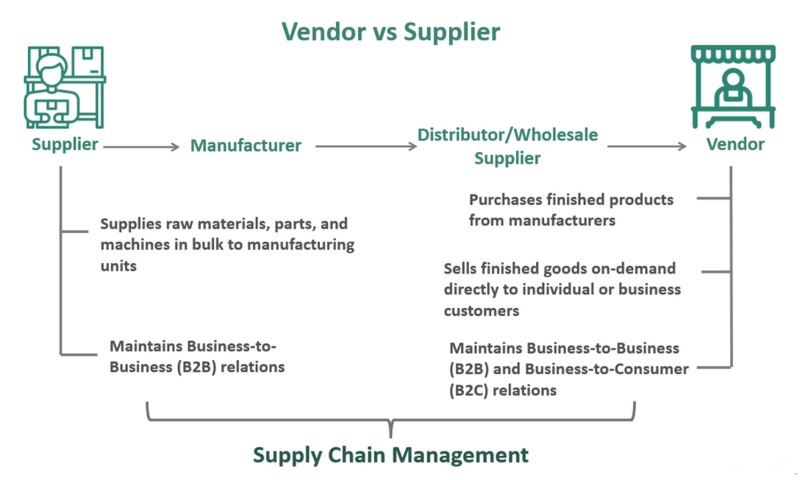Difference between revisions of "Supply chain participants"
Jump to navigation
Jump to search
Stefanseiler (talk | contribs) |
Stefanseiler (talk | contribs) |
||
| Line 8: | Line 8: | ||
* | * | ||
=== Differentiation between | === Differentiation between vendors and suppliers === | ||
{| class="wikitable" | {| class="wikitable" | ||
!'''Particulars''' | !'''Particulars''' | ||
Revision as of 19:27, 9 November 2024

The supply chain holds these types of parties (in order from upstream to downstream):
- Supplier - is a person or business that provides raw materials, parts, and machines to manufacturing units
- Manufacturer - manufactures parts in a production process and sells his products
- Distrubutor/Wholesale - purchases and sells to vendors
- Vendor - products from upstream partners and sells then directly to customers
- Customer - purchases products
Differentiation between vendors and suppliers
| Particulars | Vendors | Suppliers |
|---|---|---|
| Meaning | Purchase goods and services from manufacturers and directly distribute or sell them to consumers | Provide products and services to manufacturing units to produce finished goods |
| Objective | To meet the market demand by selling a wide variety of products to end-users for consumption | To provide processed or unprocessed primary commodities to businesses that manufacture or produce finished products for sale |
| SCM Link | Make a final link in the SCM connecting with customers | Form the first link in the SCM connecting to manufacturers, who connect with distributors and then with vendors |
| Business Relationship | Establish business-to-customer (B2C) and/or business-to-business (B2B) relationship | Maintain business-to-business (B2B) relationship only |
| Supply Volume | Sell small quantities of required products | Supply essential raw materials, tools, etc. to manufacturers in bulk |
| Relationship With Consumers | Direct | Indirect |
| Relationship With Manufacturers | Indirect | Direct |
| Level of Risk | Low due to on-demand supply | High due to bulk supply |